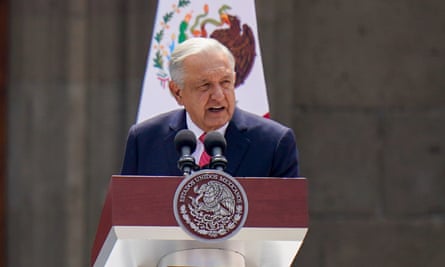Mexico’s senate has given final approval to a sweeping overhaul of the judiciary, clearing the biggest hurdle for a controversial constitutional revision that will make all judges stand for election, a change that critics fear will politicise the judicial branch and threaten the democracy.
In a marathon session that ran for more than 12 hours, and had to be paused and relocated after protesters broke into the senate building, the ruling Morena party and allies clinched the final two-thirds vote needed to approve the changes, which have prompted protests, a strike by judicial workers and market volatility.
Senators voted 86 to 41 in favour as the ruling bloc cheered and applauded the result, which cemented a victory for the outgoing president, Andrés Manuel López Obrador, who has championed the proposal.
The overhaul will take effect once published in Mexico’s official gazette.
The approval followed tense debate and political drama as the ruling coalition began on Tuesday one seat short of the super-majority needed to pass the constitutional changes.

An opposition lawmaker broke party ranks to vote in favour of the bill, while another was absent amid allegations he had been detained to stop him voting. Morena denied any wrongdoing.
“It’s a sad day for our Mexico,” said Sen Alejandro Moreno, the president of the opposition PRI party. The overhaul “was approved in the senate via the worst tricks and under unimaginable pressures and coercions”.
The change represents a significant victory for López Obrador, who claims his plan would crack down on corruption by making it easier to punish judges.
Critics say it would handicap the judiciary, stack courts with judges favouring the president’s party, allow anyone with a law degree to become a judge and make it easier for politicians and criminals to influence courts.
Mexico’s big trading partners, the US and Canada, have warned the overhaul could undermine the USMCA trade pact and negatively impact investment.
The changes to the judiciary have also spooked markets, with Mexico’s peso weakening by 17% since the elections on 2 June, when Morena won by a landslide.
As senators discussed the overhaul on Tuesday, demonstrators broke into the senate building waving Mexican flags and shouting “traitors”, forcing the session to be paused and moved to another location.
Among the protesters was Alejandro Navarrete, a 30-year-old judicial worker, who said: “Our intention is not violent, we didn’t intend to hurt them. But we intend to make it clear that the Mexican people won’t allow them to lead us into a dictatorship.”
The backbone of the constitutional changes, which the lower house approved last week, calls for the election by popular vote of more than 6,500 judges and magistrates, including the supreme court.
It also reduces the number of supreme court judges from 11 to nine, cuts the length of their terms to 12 years, abolishes a minimum age requirement of 35, and halves necessary work experience to five years.
Mexico’s incoming president, Claudia Sheinbaum, who takes office on 2 October, will be tasked with managing the fallout of the overhaul, which risks dominating the first months of her term.
Source: theguardian.com


















